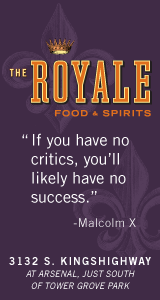By Antonio D. French
Filed Thursday, March 08, 2007 at 6:00 PM
PUB DEF EDITORIAL Labels: Editorial
For some time I have wondered privately to my closest friends if I am not wasting my time with Pub Def. By spending so much of my life writing about, learning about, and working in St. Louis City politics, am I just planting my seed in infertile ground?
As just about anyone who's grown up here knows, St. Louis is not exactly known as the land of opportunity for young people. In fact, just the opposite. After high school those that can often do exit the Gateway City for greener pastures in Chicago, Atlanta, New York, or anywhere else.
Hard work, it has seemed for so long, is not enough in a town with so few opportunities for young — and especially young, black — people.
Which is why Tuesday night was so gratifying for me. It felt as though a glass ceiling had been finally broken and that new possibilities had filled the air.
As a close witness to the tireless efforts of both Lewis Reed and Kacie Starr Triplett, I felt like finally the same rules applied regardless of race or youth. Finally, if you outwork your opponent... if you run a better campaign... if you pay attention to the fundamentals of political organizing... you can win any election in a mixed-race district — even if you are black.
THE RACE AVOIDERS
There are those that have argued that race should not even be discussed in these two contests. Most notably, fellow blogger and friend Steve Patterson and I debated this very topic the night before the election on KDHX. Steve said that the fact that Lewis Reed would (and now has) become the first African-American elected to position of Aldermanic President was irrelevant and should not be a part of the discussion of this campaign.
I cannot disagree more.
Beyond the opportunity to have someone in the President's chair with a much wider vision of the office, and beyond the possibilities for finally getting true parity in spending in northside and southside neighborhoods, the feeling of inspiration so desperately needed in neighborhoods across this city that have double-digit unemployment rates, no jobs within miles, high crime, and a general feeling among the residents of being ignored in decisions affecting their lives and that of their children — for this large population, seeing a black man do what has never been done before does matter.
And doing what it took to get that black man elected, I believe, will have far-reaching effects.
A GRAND COALITION
What I mean by that is that for the first time in a long time, black politicos put their differences aside for the greater good. State Representative Rodney Hubbard and Alderwoman April Ford-Griffin put their 5th Ward squabbles away and worked together brilliantly. Alderman Jeffrey Boyd and former Alderman Kenny Jones, who were fighting each other in the 22nd Ward all the way up to Election Day, put their differences aside in the Reed campaign office. Radio show host and activist Lizz Brown and former Alderwoman Irene Smith were able to put aside old redistricting beefs to work with southside aldermen Stephen Gregali and Jennifer Florida. There were countless examples of this kind of political maturity which so many have pleaded for for years — and because of it, we won.
These factions may go back to fighting tomorrow — and that is okay, that's politics — but when a job had to be done, they put personalities to the side to get it done. As the motto of the Congressional Black Caucus preaches: "No permanent friends and no permanent enemies, just permanent interests." Amen.
For me, this campaign was not about Board President Jim Shrewsbury. I have always had a good relationship with him and members of his staff and I hope that in time wounds will heal and we can work together in the future.
This was not personal. This was about power. To get power, you must take power. And African-Americans and true progressives deserve more power in city government.
The coalition of pro-black, pro-development, and true progressives proved that big things are possible when the small stuff is left at the door.
The night before the election, I thoroughly believed that Reed and Triplett both outworked their opponents and deserved to win. But having seen too many efforts go unrewarded in the past, I told several colleagues that what the next day was really going to show is what kind of city do we live in.
St. Louis did not let me down. I am proud of my city and the people in it. Tuesday's election has filled me with new hope about the future of our city and a new energy to help where I can to make it even better.










25 Comments:
Only 13 percent of the City voted. I wouldn't consider this a turning point. By in large, the public is quite apathetic. Reed's rhetoric was impressive and hopefully he delivers. Lets see some substance and if he takes on Blairmont.
3/08/2007 7:06 PM
Actually, I argued on my site that race needs to be discussed in this region but the time to do so rationally is not during an election between a white & a black candidate. I personally don't vote based on someone's race -- that is what is irrelevant to me personally.
My objection was the notion that Reed was "trying to become the first..." I hope that Reed was trying to become President of the Board of Aldermen first and, by chance, would be the first African-American President of the Board of Aldermen. Big difference.
Again, race needs to be discussed in this city because it remains a dividing factor --- let's not wait another two years to have the discussion.
3/08/2007 7:12 PM
Antonio, don't let the sore-losers' club influence how you feel. Your assessment of the significance of Tuesday night is spot on.
Congratulations.
3/08/2007 7:43 PM
Antonio
You are "spot on" as the British would say, with your commentary. Lewis' election is not a guarantee that we have made big strides, but a pretty good sign that when you take the hot air out of the argument, this city has the capacity to judge based on competence, vision and potential, rather than tradition.
What we need to focus on now is keeping the cynics in check and making Tuesday's election a jumping point for real progress.
Congratulations to Lewis and Mary, first, then to you and April, and Gregali, Florida, Hanrahan, Freeman, Bob Rice and the rest of the coalition that believed and made this happen.
I am proud to be from Saint Louis and look forward to watching and participating as we move forward together.
Sign me as:
One of the Steve Patterson insidious inside political players (LOL - Dont believe everything you read about the insiders - most of us embrace the environment for change and progress!)
3/08/2007 7:57 PM
Oh please, AF, self-serving, sanctimonious drivel; whine on. Would the realities have been much different if Shrewsbury had won by 6%? To be consistent, if you really believe the things you say, the answer should be "no"; should be same regardless who won. Equities and realities different based on one vote difference victory or defeat? Not really, tho the result in power is different.
3/08/2007 8:23 PM
From a republicans’ point of view it was a do or die point of view….congrads on all of the hard that you have done not only for your clients, but also for all of us in the St. Louis region
3/08/2007 9:25 PM
Saint Louis from the 6th Ward North did not let you down. Saint Louis as a whole featured a predictably polarized racial vote. The old pols all know this...and there were plenty of Southsiders who thought Jim should do more with it. To his credit, Jim did not do more with it. I wasn't paying a lot of attention to how race was being played up North, but the Saint Louis American didn't show much restraint.
There's 9,000 potential voters in the 16th ward where I live. They're pretty much all white and you'll find the ugly sentiments about race there if you want to find them. They didn't think this election was about race, but if they did I'll bet more than 2200 would have showed- and not to vote for Reed. Leave race out of this as much as you can it never leads to anything good in this City.
And a note of support to you. I moved back to my hometown after a few years on the East Coast and discovered your blog when you interviewed me and forever documented my distinction of holding one of the most absurd jobs invented in the City. Pubdef is more groundbreaking in its reporting methods than anything I was expecting from the Lou- pleasant surprise. I'm biased no doubt, but it's your most notable contribution for the city, more than any of the political stuff in your editorial- it's kind of interesting in itself that a blog might have an editorial...
3/08/2007 10:18 PM
Andy, you're wrong about the southside. On average, 35% of the southside voters went with Reed. In 4 wards (8, 15, 20, and 25) Reed actually got greater than 40% of the vote. People did cross racial lines in south St. Louis.
And please don't misunderstand me, I did not say this election was "about race". What I'm saying is that one of the ways in which this election was significant was that race mattered less in south St. Louis.
Reed won the race because he completely took north St. Louis, won the entire central corridor, and held his own on the southside.
That's really a formula for success.
3/08/2007 11:03 PM
I told you so.
3/09/2007 7:08 AM
St. Louis Oracle has an interesting look at the election at http://stloracle.blogspot.com/2007/03/racial-voting-again-dominates-citys.html
3/09/2007 8:07 AM
Let's see, we've already had two African American mayors. We have an African American comptroller, we've had an African American majority on the school board in the past.
Why does race have to become an issue as to elected offices? Now I will be thrilled when an Asian or Arab wins a city-wide election. How about a Native American? Or when will we elect Hispanics?
This really is tiresome and wearsisome and detracts from the real issues.
Even if I vote for a white person, it has nothing to do with their color, but with their ideas.
Let's get past race to what is troubling this city.
3/09/2007 8:12 AM
Coming strictly from a psychological point of view, how do you know the race of the candidate is not a factor when you vote for them?
3/09/2007 8:53 AM
Congratulations, and thank you for putting the election into a larger, hopeful perspective.
3/09/2007 9:32 AM
Because I have voted for African Americans in the past. I really don't care about race; I care about issues; and yes, there are many of us who are like that. Can any African American say they are not voting for race? Yes, because some of them, if not many, also vote according to issues and personal priciples.
3/09/2007 11:20 AM
This is an interesting tidbit from one voter: "I am further dismayed by hearing that Matt Browning's bid for Republican Alderman was underwritten by Reed & Slay to keep that block of voters from voting for Jim Shrewsbury because they had to choose either a Republican or Democrat ballot."
This is the greatest concern, how much Reed owes Slay, and many think it's a lot!
Slay will go down in history as one of the sleaziest, undermining, backstabbing mayors in the history of St. Louis. Bring Harmon or Bosley back!
3/09/2007 11:50 AM
As a causoid I agree that African American representation is important, not just in a traditional view of black political empowerment but also in terms of representation in terms of another type of local politics and policy. Past electoral data indicates that white political support for black politicians is not new--Bosley's victory in 1994 is partly due to crossover voting, particularly in the central corridor; a similar argument probably could be made for Green's first election as well. As your notes on grand coalition's indicate, increased cohesiveness among local black politicians is a significant part of this. It is less, IMO, how the election of black citywide politicians relates to changes in overall patterns of political participation and policy. I think it is generally acknowledged that St. Louis' first black mayor was significantly less progressive than the first black mayors of other cities, although this could have to due with the timing of this election, local political culture as well as the political philosophies of individual politicians. In general, local black politicians tend to reflect the same sort of local consensus around development as their white counterparts, with differences in their emphasis on more or less conventional development strategies in areas that have been traditionally passed over.
3/09/2007 11:52 AM
To date, white voters have now carried Bosley, Green, Harmon and Reed each to their first city-wide election in contested races between black and white candidates.
The lesson from Reed's win is that it's no longer about having higher turnout among your base voters of the same race. Rather, it's about appealing to central and near-south areas of diversity. That is to say, northside and southwest voters generally continue to vote along race, but it's the central and near-south voters now making the difference in city-wide contests.
Bosley came to power when the Southside was still playing by the old book and took a three-way race for granted. Shrewsbury (and Slay too) came to power at the rare moment when Northside population loss and Central/Near-South transition benefitted the high-turnout, bloc-voting Southwest. But now, even SW City is changing, albeit at a slower pace than the near-southside.
Let's hope Reed doesn't return us to the old guard of the Northside, or even a flip-flopper like Schoemehl between North and South. Rather, Reed can set up our City finally for a firm and lasting appreciation of diversity.
St. Louis has often been a "two-party" town of white Dems and black Dems. What the success of Reed and Triplett (and Jeff Smith before them) now show is that is City is set to become a "two-party" town of old Dems (race-based blocs) and young Dems. If the Democratic Party is to have any relevance to the only growing voter segment in our City, the "young Dems" must show progress to win more in the future.
3/09/2007 11:53 AM
Regarding power----is there a difference between being elected and being appointed?
Matt Blunt has appointed a former Alan Keyes delegate to the state board of education. When his appointment D. Whitmore-Smith did not go through, he appointed an african american from Kansas City, who seems to share Blunt's outlook on education. (although I was surprised to read that he was one of the 2 votes against the takeover.)
O'Brien was appointed to the local board by Slay, but she won an election later---did that cause a change in her outlook---did it make her feel less beholden to Slay's wishes?
When I tried to tell Bill McClellan that there were racial factors at work in this disenfranchisement of St. Louis voters, he would have none of it, because Slay has made so many appointments of black officials.
The scorecard of elected officials who opposed the takeover, made me believe otherwise.
If I have a point, or question, I guess it is---how would you characterize the value of being elected, compared to the value of being appointed?
3/09/2007 12:00 PM
OK, so the old racial map of St. Louis has been dead for a long time; and clearly, Reed's support crossed racial lines, even if his election repreented, among others, the outcome of a great deal of consensus among local black leaders. The question is, though, what is the substance of the representation that Reed will now provide to St. Louis' African American community (among others)? For Doug Duckworth (and for others probably) is "CAVE" mannish opposition to suburbanized development schemes. I suspect for the aldermen and alderwoman who supported his victory it is something different. Reed's self-professed agenda is impressive on paper, but it is not at all clear what Reed would do differently than his predecessor has done in a manner that substantially changes what happens in the neighborhoods.
3/09/2007 4:02 PM
Nothing dampens a fantasy party like the actual facts.
As much as we'd all like to pretend that racial voting is ebbing, it really isn't. The central corridor wards represented by white aldermen that Reed carried (7, 17, 28) all have very substantial numbers of black voters (maybe even a majority now in 17). The near south side wards carried by Shrewsbury where Reed topped 40% (8, 9, 15, 20, 25) also have substantial numbers of black voters, but fewer than the wards Reed won (Ward 20 has a black majority in population but a white majority in voters and a white monopoly in formal party organization). All of the north side black wards gave Reed over 70% of the vote (actually averaged 80%), and all but one of the south side wards not mentioned above gave Shrewsbury over 70% (the other one was 68%). Reed's least supportive black-represented ward was his own, because it has the largest white population of all the black represented wards. The blacker ward, the higher the percentage for Reed, and the whiter the ward, the higher the percentage for Shrewsbury.
The other dirty little secret of the election was the much of the cross-racial outreach was based on hatred. The white aldermen backing Reed all had axes to grind with Shrewsbury, and the Reed campaign was brilliant in redirecting that anti-Shrewsbury hatred into support for Reed. But when the next black/white split takes place on the floor of the board, don't count on those folks to cross over again.
The Reed campaign did what it needed to do to make this history-making upset happen, and it deserves the congratulations it has received (including from me). But don't delude yourselves into thinking that any kind of new color-blind era has begun, because everything's still pretty much the same.
3/09/2007 8:21 PM
AMEN!
3/11/2007 6:23 PM
Thanks, Oracle. You and Doug Duckworth bookend this discussion well. As Outkast said back in 1994, "ain't nothing changed, just a couple more names".
Antonio, your blog has officially devolved into your own opinion site. While you were always good for the occasional editorial, the last six months have seen a dramatic rise in biased commentary, to the detriment of straight news and facts. It's almost totally an opinion site. This, young man, is not hard news, and ergo, no longer journalism.
3/11/2007 8:08 PM
I grew up in this city and as you wrote, I moved out as soon as I graduated from high school. Why, because of the small minded attitude of most of the people here. I went into the deep south and found more unity in people from all over the world than I ever saw growing up. Family brought me back 12 years later and it seems little has changed really. St. Louis still seems to be one of the the most racially segregated cities in the US. The fact that we even feel the need to bring up race tells the tale of a long history of racial problems. It seems the problems are from both blacks and whites. Whites have this us vs. those people attitude while blacks enjoy the victim role all too much. Although I am glad for Reed as I feel he ran a good campaign, it is time for African Americans to stop looking for a "Moses" to free us. It is time for us to stand in our own power and when we do that, there is no need to point it out because it is self evident. Whites need to open their minds beyond their narrow perspective and understand that their subconscious urges to maintain control of everything is an extension of the fear of retribution that comes from long term guilt. Both sides carry badges of pain and fear. It is time to let it go and when we do, St. Louis will truly become progressive.
3/11/2007 8:45 PM
"Antonio, your blog has officially devolved into your own opinion site."
A blog as an opinion site? What a novel idea.
3/11/2007 10:54 PM
Ignoring the obvious to create spin for yourself demonstrates why StL will continue to fail. The bottom has yet to be reached. The area, especially the city, will become more polarized and isolated from the region. Like the SLPS the only hope will be a takeover... sad but true.
3/12/2007 7:44 AM
Post a Comment
<< Home